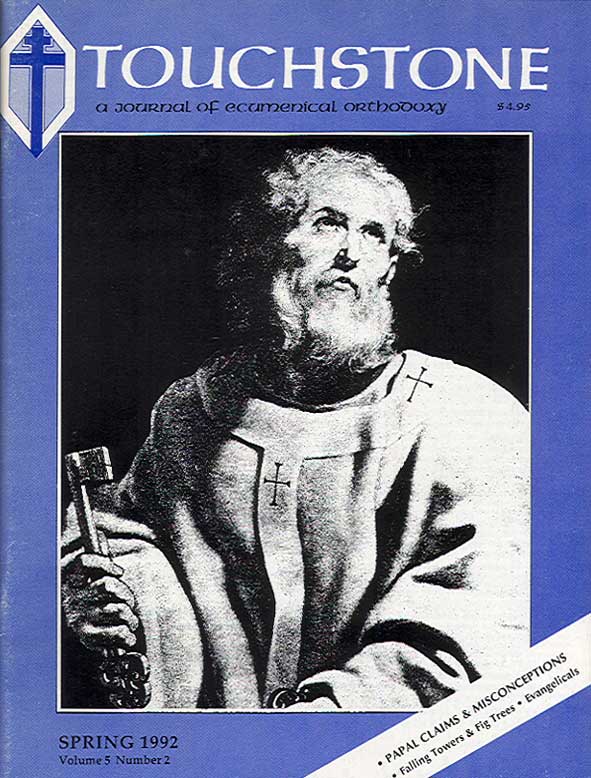Just Another Religion?
We hear it over and over: this is a post-Christian era; relativism and pluralism now reign. Christendom, as the late Malcolm Muggeridge so cogently argued, long down for the count, is gone for good. The secular revolution has left us groping for the gospel’s relevance to the West and has enmeshed the Church in a materialism from which it seems unwilling to escape. How are Christians to uphold the uniqueness of Christianity in a pluralistic society? Is there any chance of winning the argument for Christianity in the West?
It is imperative that we understand the nature of the new religious views, for they are commonly held. Religious pluralism reigns in the Church itself. If you ask the average Catholic or Protestant whether other religions are legitimate ways to salvation, they would say they are.
The gospel of religious relativism, proclaimed by John Hick, Paul Knitter, and the followers of Joseph Campbell, was the focus of a recent conference at Wheaton College. Several speakers compared the revolution that has taken place in the theology of religions to the Copernican revolution. We used to think that the earth was the center of the universe, around which the sun, moon, planets, and everything else revolved. Copernicus proved that the sun is the center of our solar system, and that the earth is only one of many planets that circle it.
Just as we thought the earth was the center of the universe, so we thought that Christianity was the center around which all truth revolves. But the Copernicuses of the theological schools have “discovered” that Christianity is only one of many legitimate religions that have to do with the hidden God and that end in salvation. The religions are simply different windows looking out on the same spiritual or divine reality. Five hundred years ago Christopher Columbus discovered that we can sail in opposite directions but reach the same point on the globe. Might we not be able to travel in any one of a number of religious directions and reach the same God and the same enlightenment and salvation? So runs much of the thought today.
While we must have a positive Christian alternative to this pluralistic view, one criticism of the way in which this view is held may be helpful in responding to it. As Anglican theologian Alister McGrath pointed out at the Wheaton conference, the advocates of this position assume that all of the religions are essentially the same underneath. To discover the common ground, though, all of the distinctive beliefs of the religions must be stripped away. The pluralists claim to understand the real meaning of not only Christianity, but also of all the other religions—and they assume that they understand them better than their adherents. While they chide conservative Christians for their imperialistic view of Christianity as the only true faith, they assert, ironically, that the only people who understand the real meaning behind all the world’s religions are Western Liberal theologians.
How will we who do not accept the new gospel of religious pluralism respond to the challenge? In order to seize the opportunity for effective witness, we must stop falling into the trap of talking about Christianity as if it were simply a religion. Our faith is primarily an incarnational reality, which first flows from Christ himself, then must be expressed by a living Christian community, and then only by us as individual Christians in a manner shown to us by the example of Christ himself.
In the first place, Christianity is not so much a religion as it is a Person. We have been confronted with the claim that Jesus of Nazareth, son of Mary, is actually God in the flesh. “He who has seen me has seen the Father,” said Jesus. In the face of Jesus, we see the glory of the eternal God. There is an absolute chasm between Christianity and all religions on this point. No Incarnation, no Christianity. Our faith cannot be merely one of many windows which look out to God—Christ, in the words of the Creed, is “true God of true God.” But it is not some vague “cosmic Christ” who is at the center of the Church and our experience. It is “the man of Christ Jesus” (1 Timothy 2:5) who is the head of the Church.
We cannot take the doctrine of the Incarnation for granted nor take it as a matter of mere theology. Unless the Church experiences the living presence of the Person of the Risen Christ, through the Holy Spirit, our theology remains a cold text. We fall under the same condemnation of those to whom Jesus said, “You search the Scriptures, because you think that in them you have eternal life; and it is they that bear witness to me. Yet you refuse to come to me that you may have life” (John 5:39–40). This encounter is beyond what any other religion can claim.
In the second place, for our witness to be effective, the encounter with Christ must be made incarnationally present to the world through the Church. Paul wrote that it was to be “through the Church that the manifold wisdom of God should be made known to the rulers and authorities in the heavenly places.” It is the living face of the Church that must make Christ known to the world. This point has been made by Stanley Hauerwas (in Resident Aliens), Charles Colson, (in Against the Night), and others. The life to which those who follow Christ are called—“with all lowliness and meekness, with patience, forbearing one another in love, eager to maintain the unity of the Spirit in the Bond of peace” (Ephesians 4:2)—can only be exercised in community.
Unity is one aspect of the Christian community. It is the unity of the community of Christ that can persuade the world of the radical uniqueness and truth of Christianity. We are called to pray and labor in accord with our Lord’s prayer to the Father for his disciples, “that they may be one even as we are one, I in them and thou in me, that they may become perfectly one, so that the world may know that thou hast sent me” (John 17:23).
No one is exempt from criticism on the point of disunity. And it is not enough to hide behind theologically sophisticated ecclesiological definitions that render the Church a perfect community in no need of correction from its living head. The scandal of Protestant denominationalism in the West is at least matched if not surpassed by the spectacle of Catholics and Orthodox squabbling in Eastern Europe, particularly in Ukraine, over ecclesiastical turf. This does not show the wisdom of God nor the beauty of Christ to any one of the millions who hunger for spiritual life. Orthodox patriarch and Roman Catholic pope appear to be at each other’s jurisdictional throats, and Catholics and Orthodox have literally beaten each other and barred church doors in pressing their claims of ownership and jurisdiction. Orthodox and Catholic relations may well have been set back thirty or forty years by recent events. The witness of the Church is not well served when it acts as the rest of the world does and not as the unique community of Christ. The world must see how we love one another.
James M. Kushiner is the Director of Publications for The Fellowship of St. James and the former Executive Editor of Touchstone.
bulk subscriptions
Order Touchstone subscriptions in bulk and save $10 per sub! Each subscription includes 6 issues of Touchstone plus full online access to touchstonemag.com—including archives, videos, and pdf downloads of recent issues for only $29.95 each! Great for churches or study groups.
Transactions will be processed on a secure server.
more from the online archives

31.5—September/October 2018
Errands into the Moral Wilderness
Forms of Christian Family Witness & Renewal by Allan C. Carlson
calling all readers
Please Donate
"There are magazines worth reading but few worth saving . . . Touchstone is just such a magazine."
—Alice von Hildebrand
"Here we do not concede one square millimeter of territory to falsehood, folly, contemporary sentimentality, or fashion. We speak the truth, and let God be our judge. . . . Touchstone is the one committedly Christian conservative journal."
—Anthony Esolen, Touchstone senior editor










